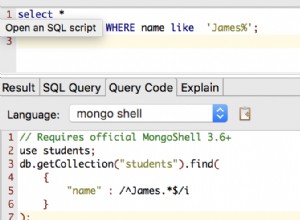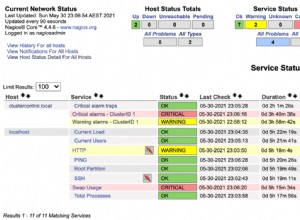W ten sposób zmuszam MongoDB do przechowywania surowej wartości i ignoruje atrybut DateTimeKind w obiekcie DateTime.
Może to nie dotyczyć Twojej logiki biznesowej, ale ma dla nas sens z naszych szczególnych powodów.
BsonSerializer.RegisterSerializer(typeof(DateTime), new MyMongoDBDateTimeSerializer());
public class MyMongoDBDateTimeSerializer : DateTimeSerializer
{
// MongoDB returns datetime as DateTimeKind.Utc, which cann't be used in our timezone conversion logic
// We overwrite it to be DateTimeKind.Unspecified
public override object Deserialize(MongoDB.Bson.IO.BsonReader bsonReader, System.Type nominalType, MongoDB.Bson.Serialization.IBsonSerializationOptions options)
{
var obj = base.Deserialize(bsonReader, nominalType, options);
var dt = (DateTime) obj;
return new DateTime(dt.Ticks, DateTimeKind.Unspecified);
}
// MongoDB returns datetime as DateTimeKind.Utc, which cann't be used in our timezone conversion logic
// We overwrite it to be DateTimeKind.Unspecified
public override object Deserialize(MongoDB.Bson.IO.BsonReader bsonReader, Type nominalType, Type actualType, MongoDB.Bson.Serialization.IBsonSerializationOptions options)
{
var obj = base.Deserialize(bsonReader, nominalType, actualType, options);
var dt = (DateTime)obj;
return new DateTime(dt.Ticks, DateTimeKind.Unspecified);
}
// MongoDB stores all datetime as Utc, any datetime value DateTimeKind is not DateTimeKind.Utc, will be converted to Utc first
// We overwrite it to be DateTimeKind.Utc, becasue we want to preserve the raw value
public override void Serialize(MongoDB.Bson.IO.BsonWriter bsonWriter, System.Type nominalType, object value, MongoDB.Bson.Serialization.IBsonSerializationOptions options)
{
var dt = (DateTime) value;
var utcValue = new DateTime(dt.Ticks, DateTimeKind.Utc);
base.Serialize(bsonWriter, nominalType, utcValue, options);
}
}




